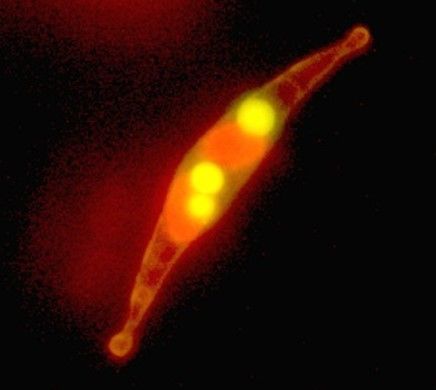Advanced Modules
The compulsary elective modules 3-10 can be attended in the second semester. From up the third semester a specialisation in the resarch field of the respective working group can be completed.
The lecture gives an overview about chloroplast biochemistry in plants and algae, with a focus on regulation phenomena. In the practical you will work in a group of two on your own project within a current topic of my research, applying modern methods in biochemistry, genetic modification and spectroscopy.
Research
Our research focusses on the light
perception for photosynthesis and for regulation phenomena in
diatoms, and their potential for biotechnological approaches. Diatoms
are eukaryotic algae responsible for about one fifth of the
world-wide oxygen production. Methods include biochemical and
spectroscopic characterisation of proteins from wild-type and
genetically modified diatoms.

The diatom Phaeodactylum tricornutum was genetically modified in order to increase the storage lipid content. After nile red staining the lipid droplets show up in yellow.
Module 5a explores fundamental aspects of plant physiology through hands-on experiments, bioinformatic and statistical analyses, and an accompanying lecture and seminar. Students engage in experiments focused on stomatal regulation, plant hormones, plant tropisms, and gene regulation, gaining practical insights into how plants respond to environmental stimuli in a changing climate. The corresponding lecture and seminar provide a comprehensive understanding of the underlying mechanisms governing plant growth and development.
Research
Our research endeavors
focus on elucidating the intricate mechanisms governing plant
responses to gravity and climate change. Through meticulous
investigations into gravireceptors, signaling pathways, secondary
messengers, and hormones, we aim to unravel the complexities of how
plants perceive and orient themselves in gravitational fields. We
employ innovative techniques such as clinostats, centrifuges, and
experiments in altered gravity environments, including platforms like
sounding rockets and the ISS. Our research also extends to the study
of guard cell movements, elucidating responses to environmental
stimuli, such as pathogen recognition, activation of anion channels,
and adjustments in stomatal aperture, with the overarching objective
of enhancing plant resistance to climate change.
Research
Our primary research focuses on the molecular mechanisms controlling root stem cell maintenance, vital for the growth and survival of higher plants, especially as roots are key for anchorage and nutrient access. Given the challenges of anthropogenic climate change, understanding the underlying intricate molecular processes is crucial for plant development and architecture. Our team aims to apply insights from the model plant Arabidopsis thaliana research to barley (Hordeum vulgare), enhancing plant resilience against adverse climate conditions and contributing to food security.
Research
Over 50% of all drugs are derived from natural products or have drawn inspiration from them. In the Helfrich lab, we develop genomics-based strategies to identify natural product biosynthetic pathways in bacterial genomes. We characterize the natural products associated with these biosynthetic gene clusters, and study their molecular structures, bioactivities, and the sophisticated processes by which they are biosynthesized. Our investigations particularly focus on unusual biosynthetic enzymes and transformations, as well as the role of the natural products within their native environments. To achieve these goals, we leverage cutting-edge technologies in bioinformatics, genomics, synthetic biology, biotechnology and metabolomics.
In the module “Molecular Cell Biology and Biochemistry of Eukaryotic Systems" students engage with the fundamental aspects of protein homeostasis, including mechanisms of protein folding, targeting, and quality control, and how these processes are regulated to sustain cellular balance in response to diverse stimuli across eukaryotes. The practical course provides hands-on experience, allowing students to use genetic, physiological, molecular, and biochemical tools to study these mechanisms in plants, highlighting their importance in cell and plant growth and development and stress resilience. This systematic exploration offers insights into protein dynamics, which are crucial for advanced research in cell biology and plant sciences.
Research
As climate change challenges ecosystems and
crop yield, our research group focuses on understanding plant
resilience to environmental stress, particularly high temperatures.
We investigate how plants regulate their response to different stress
scenarios, and aim to identify thermotolerance mechanisms that are
critical for stress resilience. Our team utilizes advanced
physiology, molecular, and genetic tools to study how plants modify
their transcriptome landscape to protect against stress and optimize
recovery, and ensure how proteins are delivered to the right cellular
destination with the aim to discover new strategies to improve plant
performance and increase crop yields under challenging environmental
conditions.
FB 15 - Biological Sciences
Program Coordinator
Dr. Markus Fauth
m.fauth@bio.uni-frankfurt.de
Biocentre, Campus Riedberg
Building N210, Room 2.07
Max-von-Laue-Str. 9
60438 Frankfurt am Main
T +49 69 798-29603
Program Director
Prof. Dr. Claudia Büchel
info-mbw@bio.uni-frankfurt.de
Biocentre, Campus Riedberg
Building N210, Raum 2.07
Max-von-Laue-Str. 9
60438 Frankfurt am Main
- Studying at Goethe University
- International applicants
- Faculties
- Overview of study programmes
- Programme for refugees
- GRADE
- Goethe Business School (continuing education)
- Research at Goethe University
- Scientific news
- Goethe Welcome Center (for international researchers)
- Collaborative research projects
- Individual research
- Visiting fellowships
- Endowed chairs
- About the University
- News-in-brief
- University administration
- Campus locations
- Campus life
- University archives (German)
- Rhine-Main-Universities





